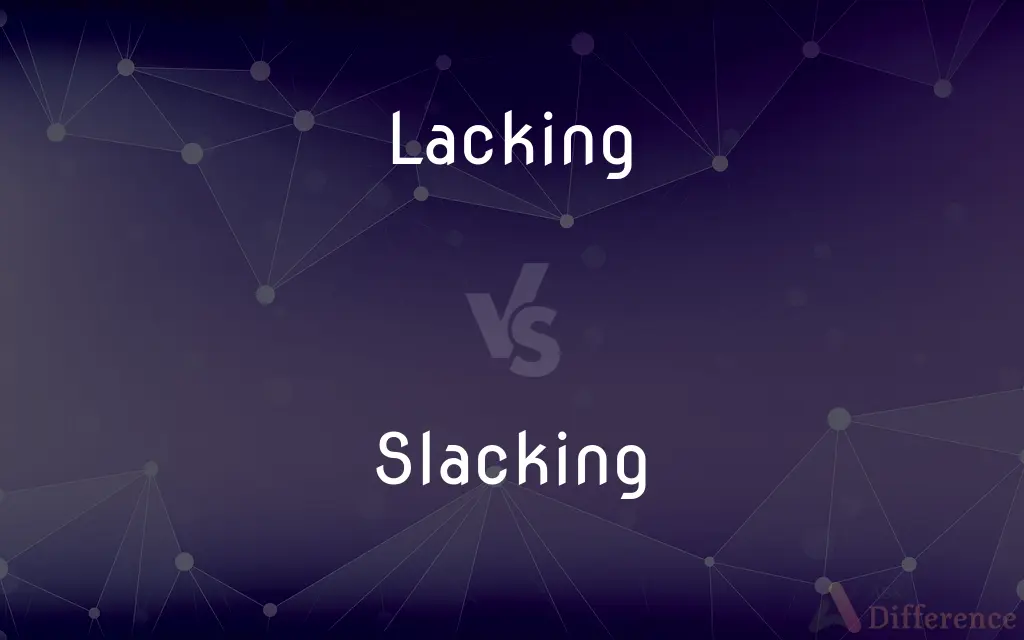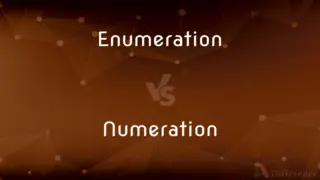Lacking vs. Slacking — What's the Difference?
By Tayyaba Rehman & Urooj Arif — Updated on April 2, 2024
Lacking refers to the absence of something needed, while slacking denotes negligence in performing duties or tasks.

Difference Between Lacking and Slacking
Table of Contents
ADVERTISEMENT
Key Differences
"Lacking" describes a situation or condition where something necessary is absent or not available. It implies a deficiency or shortage that can affect functionality or completeness. Whereas "slacking" refers to the act of reducing effort or failing to apply oneself diligently. It's often associated with laziness or the deliberate act of being less productive than one is capable of. This distinction highlights the difference between an external deficiency and an internal choice or behavior.
When we say a process or object is lacking something, we're pointing out a gap or missing element that prevents it from being whole or functioning optimally. This could apply to tangible items, such as a machine missing a part, or intangible concepts, such as a plan lacking clarity. On the other hand, slacking is about performance and effort, specifically the reduction thereof. It's a behavior rather than a state, reflecting an individual's choice to not fully engage with their tasks or responsibilities.
Lacking can be remedied by the addition of the missing element or quality. For instance, a team lacking expertise in a certain area can improve by acquiring the necessary knowledge or skills. Slacking, however, requires a change in attitude or work ethic. It's about personal or collective motivation to fulfill duties to the best of one's abilities.
In some contexts, lacking and slacking can intersect. For example, a team might be slacking because it lacks clear direction or motivation from leadership. Here, the deficiency (lacking leadership) directly influences behavior (slacking). Conversely, a person or team's slacking behavior might lead to a project lacking in quality or completeness.
Addressing a lack involves identifying and supplying the missing component, while combating slacking demands addressing the underlying reasons for the reduced effort, whether they be motivational, organizational, or personal.
ADVERTISEMENT
Comparison Chart
Definition
Absence of something necessary or desired.
Reducing effort or failing to work diligently.
Nature
Descriptive of a deficiency.
Descriptive of behavior or attitude.
Remedy
Addition of the missing element.
Change in attitude or motivation.
Examples
A plan lacking detail.
An employee avoiding tasks.
Contexts
Can be applied to objects, processes, or skills.
Primarily associated with personal or collective work ethic.
Compare with Definitions
Lacking
Refers to a state or condition.
The project was lacking a clear leader, causing confusion.
Slacking
Behavioral, related to work or duty.
The team started slacking after the initial success, impacting momentum.
Lacking
Descriptive of a deficiency.
The team's strategy was lacking in innovation.
Slacking
Subject to change with motivation.
Once motivated, his slacking behavior turned into productivity.
Lacking
Not sufficient.
Her preparation for the exam was lacking, reflected in the scores.
Slacking
Laziness or lack of diligence.
Slacking in her studies led to her falling behind the class.
Lacking
Can be quantified or qualified.
The soup was lacking salt, affecting its taste.
Slacking
Can lead to negative outcomes.
Slacking off during practice sessions cost the team the championship.
Lacking
Absence of something necessary.
The report was lacking critical data, making conclusions difficult.
Slacking
Reducing effort on purpose.
He was slacking on the job, leading to delays in the project.
Lacking
Deficiency or absence
Lack of funding brought the project to a halt.
Slacking
Not tense or taut; loose
A slack rope.
Slack muscles.
Lacking
A particular deficiency or absence
Owing to a lack of supporters, the reforms did not succeed.
Slacking
Lacking in activity; not busy
A slack season for the travel business.
Lacking
To be without or in need of
Lacked the strength to lift the box.
Slacking
Moving slowly; sluggish
A slack pace.
Lacking
To be missing or deficient
We suspected that he was lying, but proof was lacking.
Slacking
Lacking in diligence or due care or concern; negligent
A slack worker.
Lacking
To be in need of something
She does not lack for friends.
Slacking
Flowing or blowing with little speed
A slack current.
Slack winds.
Lacking
Present participle of lack
Slacking
(Linguistics) Pronounced with the muscles of the tongue and jaw relatively relaxed; lax.
Lacking
The absence of something; a lack.
Slacking
To make looser or less taut
Slacked the sail.
Lacking
Missing or not having enough of (a good quality, etc).
This cheese is lacking in pungency.
Slacking
To make slower
Slacked our pace.
Lacking
Not existing;
Innovation has been sadly lacking
Character development is missing from the book
Slacking
To be careless or remiss in doing
Slack one's duty.
Lacking
Inadequate in amount or degree;
A deficient education
Deficient in common sense
Lacking in stamina
Tested and found wanting
Slacking
To slake (lime).
Slacking
To be or become slack.
Slacking
To be inactive or avoid work
Slacked around the house all day.
Slacking
A loose part, as of a rope or sail
Hauled in the slack.
Slacking
A period of little activity; a lull
A slack in business.
Slacking
A cessation of movement in a current of air or water.
Slacking
An area of still water.
Slacking
Unused capacity
Still some slack in the economy.
Slacking
Slacks Casual pants that are not part of a suit.
Slacking
In a slack manner
A banner hanging slack.
Slacking
Present participle of slack
Slacking
The evasion of work or duty
Common Curiosities
Can a situation be both lacking and slacking?
Yes, a situation can exhibit both if there's a deficiency causing reduced effort or motivation.
What is slacking behavior?
Slacking behavior refers to reducing effort or not applying oneself fully in tasks or duties.
How can you address a problem that is lacking?
Addressing a lacking problem involves identifying and supplying the missing component.
How can one stop slacking?
Stopping slacking requires addressing the underlying motivational issues and possibly adjusting goals or work environments.
What causes slacking?
Slacking can be caused by a lack of motivation, interest, or engagement with the task at hand.
Can technology help in overcoming a lacking state?
Technology can provide solutions that fill the gap or deficiency, overcoming the lacking state.
Can a team be slacking due to lacking resources?
Yes, a team may slack if they lack the necessary resources or guidance, feeling unmotivated as a result.
What does it mean when something is lacking?
When something is lacking, it means there's an absence of a necessary or desired element.
How do you identify if a project is lacking or if the team is slacking?
Assess if there’s a deficiency in resources or planning (lacking) versus a reduction in effort or engagement (slacking).
Can personal attitudes affect both lacking and slacking?
Yes, personal attitudes can influence perceptions of deficiency and levels of effort, impacting both states.
Is lacking always negative?
While typically considered negative due to its association with deficiency, the recognition of lacking can lead to improvement.
Is lacking a permanent state?
No, lacking is not permanent and can be remedied by adding the necessary elements or qualities.
How does leadership play a role in addressing lacking and slacking?
Effective leadership can identify and address deficiencies, as well as motivate and engage teams to reduce slacking.
Is it easier to address lacking or slacking?
It depends on the context; lacking can be straightforward if the missing element is identified, but slacking requires motivational changes.
Does slacking always affect productivity?
Yes, slacking generally leads to reduced productivity and may affect overall outcomes.
Share Your Discovery

Previous Comparison
Enumeration vs. Numeration
Next Comparison
Flit vs. FlyAuthor Spotlight
Written by
Tayyaba RehmanTayyaba Rehman is a distinguished writer, currently serving as a primary contributor to askdifference.com. As a researcher in semantics and etymology, Tayyaba's passion for the complexity of languages and their distinctions has found a perfect home on the platform. Tayyaba delves into the intricacies of language, distinguishing between commonly confused words and phrases, thereby providing clarity for readers worldwide.
Co-written by
Urooj ArifUrooj is a skilled content writer at Ask Difference, known for her exceptional ability to simplify complex topics into engaging and informative content. With a passion for research and a flair for clear, concise writing, she consistently delivers articles that resonate with our diverse audience.















































